新目标英语九年级Unit3SectionB(2a-2d)精品教案
人教版新目标九年级英语第3单元Unit3教案
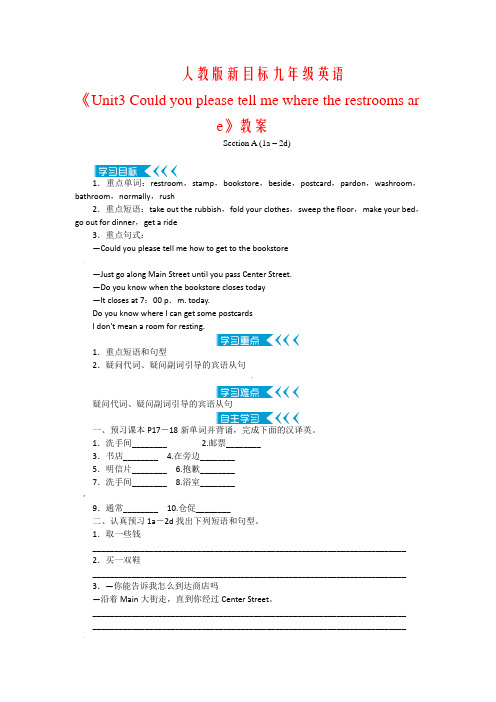
人教版新目标九年级英语《Unit3 Could you please tell me where the restrooms are》教案Section A (1a-2d)1.重点单词:restroom,stamp,bookstore,beside,postcard,pardon,washroom,bathroom,normally,rush2.重点短语:take out the rubbish,fold your clothes,sweep the floor,make your bed,go out for dinner,get a ride3.重点句式:—Could you please tell me how to get to the bookstore.—Just go along Main Street until you pass Center Street.—Do you know when the bookstore closes today—It closes at 7:00 p.m. today.Do you know where I can get some postcardsI don't mean a room for resting.1.重点短语和句型2.疑问代词、疑问副词引导的宾语从句'疑问代词、疑问副词引导的宾语从句一、预习课本P17-18新单词并背诵,完成下面的汉译英。
1.洗手间________ 2.邮票________3.书店________ 4.在旁边________5.明信片________ 6.抱歉________7.洗手间________ 8.浴室________>9.通常________ 10.仓促________二、认真预习1a-2d找出下列短语和句型。
1.取一些钱________________________________________________________________________2.买一双鞋________________________________________________________________________3.—你能告诉我怎么到达商店吗—沿着Main大街走,直到你经过Center Street。
新目标英语九年级Unit 3 Section B (2a-Self Check) 教案
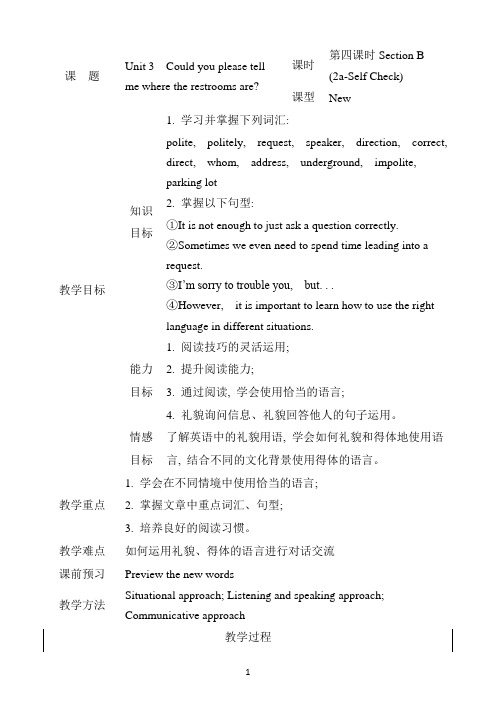
课题Unit 3Could you please tellme where the restrooms are?课时第四课时Section B(2a-Self Check)课型New教学目标知识目标1. 学习并掌握下列词汇:polite, politely, request, speaker, direction, correct,direct, whom, address, underground, impolite,parking lot2. 掌握以下句型:①It is not enough to just ask a question correctly.②Sometimes we even need to spend time leading into arequest.③I’m sorry to trouble you, but. . .④However, it is important to learn how to use the rightlanguage in different situations.能力目标1. 阅读技巧的灵活运用;2. 提升阅读能力;3. 通过阅读, 学会使用恰当的语言;4. 礼貌询问信息、礼貌回答他人的句子运用。
情感目标了解英语中的礼貌用语, 学会如何礼貌和得体地使用语言, 结合不同的文化背景使用得体的语言。
教学重点1. 学会在不同情境中使用恰当的语言;2. 掌握文章中重点词汇、句型;3. 培养良好的阅读习惯。
教学难点如何运用礼貌、得体的语言进行对话交流课前预习Preview the new words教学方法Situational approach; Listening and speaking approach; Communicative approach教学过程教学环节教师活动学生活动备课札记Step 1 Warm up and work on2a Ask students todiscuss“Where do youneed to make politerequests? ”Discuss“Where doyou need to makepolite requests? ”读前活动旨在为阅读铺垫, 激活学生对阅读话题或者内容的相关知识, 并引出本课时话题。
人教九年级Unit3Section B 2a2d教案
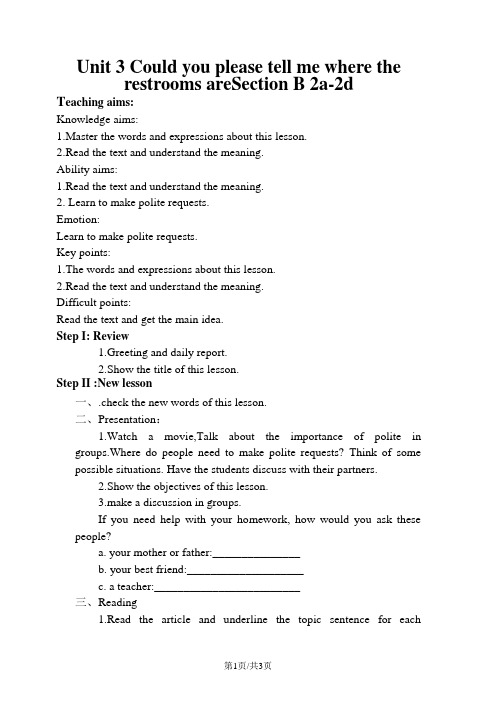
Unit 3 Could you please tell me where the restrooms areSection B 2a-2dT eaching aims:Knowledge aims:1.Master the words and expressions about this lesson.2.Read the text and understand the meaning.Ability aims:1.Read the text and understand the meaning.2. Learn to make polite requests.Emotion:Learn to make polite requests.Key points:1.The words and expressions about this lesson.2.Read the text and understand the meaning.Difficult points:Read the text and get the main idea.Step I: Review1.Greeting and daily report.2.Show the title of this lesson.Step II :New lesson一、.check the new words of this lesson.二、Presentation:1.Watch a movie,Talk about the importance of polite ingroups.Where do people need to make polite requests? Think of some possible situations. Have the students discuss with their partners.2.Show the objectives of this lesson.3.make a discussion in groups.If you need help with your homework, how would you ask these people?a. your mother or father:_______________b. your best friend:____________________c. a teacher:_________________________三、Reading1.Read the article and underline the topic sentence for eachparagraph.2.Read paragraph 1 and answer the following question:What else do we need to learn besides asking a question correctly when you ask for help?3.Read paragraph 2 and answer the question.What do we need to think about when you talk to different people?4.Read the whole text,Find all the direct questions and polite5.Discuss and translate the text into Chinese.6.Explain the expressions.*Both are correct, but the first one sounds less polite.less + 形容词或副词, 构成降级比较形式, 相当于中文“不那么; 稍许不……”之意。
最新人教新目标版九上英语Unit3SectionB(2a-2d)【教案】

The T can elicit more ways to make requests from Ss and make a summary:
Where is the History Museum?
How can I get to the History Museum?
know them well.
Para.3
Q: What are the features of polite language?
A: Usually polite questions are longer. They include expressions such as “Could you please ...?” or “May I ask ...?”
Para.4
Q: In the second picture, why does the man say“Sorry, I can’t help you.”? Can you change the question to a more polite one?
A: Because the man is too impolite, he asks directly.
mall, etc.
At school.
At home, especially when speaking to your elders.
2b
Task 1 Skimming
The T can ask Ss to read the passage quickly and find the topic sentence of each paragraph so that Ss can grasp the main idea of the passage in a short time. Then the T can invite some Ss to share their answers with the class.
人教版英语九年级全一册-Unit 3 Section B (2a-2d)教案

九年级Unit 3 Could you please tell me where the restrooms are?Section B 2a-2d Could you please...?教学设计Teacher :Analysis: This unit is about asking for information politely. This reading passage is telling us where should we need to make polite requests and how. Students have learned how to say politely in Section A and they will keep learning how to make polite requests in the reading passage. They will be interested in talking rudely and politely and compare with different ways of speaking. So the teacher will design these kinds of activities for them to learn better.Objectives:1. Language skillsStudents will be able to make polite requests according to different situations and different people.Students will learn how to make polite requests.Students will be able to rewrite impolite requests.2. Language knowledgeStudents will be grasp these new words and sentence structures, politely, request, direction, correct, polite, direct, speaker, impolite, Could you please...? May I ask...? Excuse me, I wonder if you can help me. I’m sorry to trouble you, but...Students will be able to speak politely, gently and slowly when making request.3. AffectsStudents will be able to choose and use suitable language based on cultural knowledge, such as in a foreign country, in public places, at school and at home.4. Cultural awarenessStudents will be able to learn to ask politely and pay attention to the body language and remember to say thank you.Students will learn not to ask rude questions, such as age, salary or use rude gestures.5. Learning strategyStudents will be able to realize the wrong ways they are using in daily life and correct them. Students will be able to get information from the pictures given from the passage.Focuses:Students will be able to choose and use suitable language based on cultural knowledge, such as in a foreign country, in public places, at school and at home.Students will be able to rewrite impolite requests.Difficulties:Students will be able to learn to ask politely and pay attention to the body language and remember to say thank you.Students will be able to realize the wrong ways they are using in daily life and correct them. Students will be able to get information from the pictures given from the passage.Teaching process:So let’s take a look at the structure of the passage. First paragraph, the writer leads in the topic. ...Step 3 Close-readingT: So what examples does the writer give us to lead in the topic? Request 1 VS Request 2Topic: When we visit a foreign country, we need to ask for help_________ and _________.T: How can we speak politely? What does a good speaker do? What examples does the writer give us as good speakers?When is the school trip?Excuse me, Mr. West. Do you know when the school trip is?T: Whom do we usually say it to?Why?Tip 1: Good speakers change the way they speak depending on__________________ and ___________________.T: How can we make questions longer and more polite?Could you please...?May I ask...?Excuse me, I wonder if you can help me.I'm sorry to trouble you, but.......Tip 2: Longer questions can be more ______ and we need to spend time ___________________before asking for help.PracticeWhat are you going to say to them if you are thirsty? Can you talk about it with your partner?What does the writer tell us in the end?Why do we need to speak politely? 细读阶段,通过找作者给出的例子一步步带出话题和make polite requests 的两个方法。
Unit3SectionB(2a-2d)教案九年级英语全一册精品课堂(人教版)
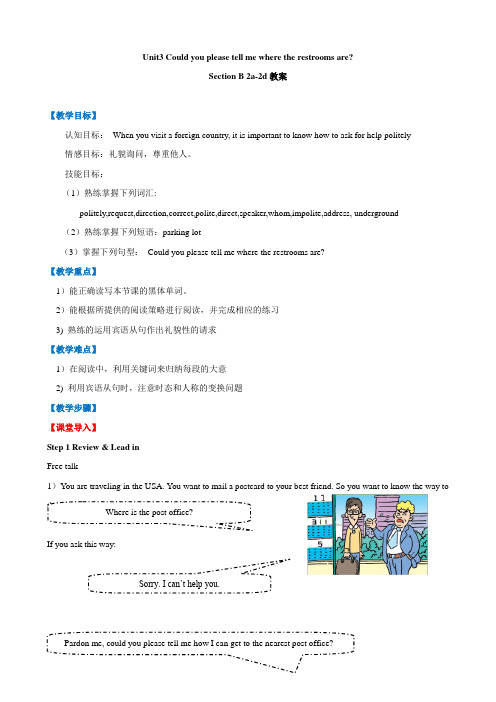
Unit3 Could you please tell me where the restrooms are?Section B 2a-2d 教案【教学目标】认知目标:When you visit a foreign country, it is important to know how to ask for help politely情感目标:礼貌询问,尊重他人。
技能目标:(1)熟练掌握下列词汇:politely,request,direction,correct,polite,direct,speaker,whom,impolite,address, underground (2)熟练掌握下列短语:parking lot(3)掌握下列句型:Could you please tell me where the restrooms are?【教学重点】1)能正确读写本节课的黑体单词。
2)能根据所提供的阅读策略进行阅读,并完成相应的练习3) 熟练的运用宾语从句作出礼貌性的请求【教学难点】1)在阅读中,利用关键词来归纳每段的大意2) 利用宾语从句时,注意时态和人称的变换问题【教学步骤】【课堂导入】Step 1 Review & Lead inFree talk1)You are traveling in the USA. You want to mail a postcard to your best friend. So you want to know the way to the post office. How would you ask for the way?Where is the post office?If you ask this way:Sorry. I can’t help you.Pardon me, could you please tell me how I can get to the nearest post office?If you ask this way:Sure. Go along this street, turn right at the second crossing, you can see it on your left.2)In different situations, you need to choose and use suitable language based on cultural knowledge.3)Let’s choose.(巩固“礼貌请求用语”)【课堂活动】Step 2 Discussion (2a)Pre-reading1)Where do you need to make polite requests? Think of some possible situations. Discuss them with your partner. 2)Predict the passage. In your opinion, what’s the right order of the following sentences?3)Make students understand the meaning of questions in 2a, then finish it.Step 3 Reading (2b)1)Make students understand the meaning of questions in 2b. Read and understand the article, then finish it. Check the answers.2) Underline the topic sentences for each paragraph.3)Read and finish tasksParagraph 1.Read Paragraph 1 and answer the questions.Paragraph 2. Read Paragraph 2 and answer the questions.Paragraph 3. 默读第三段,判断正误Paragraph 4. Read Paragraph 4 and answer the questions.Step 4 Polite requests (2c)1.Make students understand the meaning of questions.Highlights: the choice of conjunctions and the adjustment of the object clause’s word order.2 Finish 2c individually, then check the answers.Step 5 Practice (2d)1.Make students understand the meaning of questions in 2d. Practice to use the first sentence as sample.2.Read the questions in Request in roles. Boys read the main clauses and girls read the subordinate clauses. Let the students question incomprehension sentences.3.Finish 2d, then check the answers.4.Listen and repeat.Step 6 Language points (见PPT)【课堂小结】1. We have learnt how to use suitable language for a request.2. We have learnt how to read for details.3. We have learnt some key words involving this text.【课堂训练】PPT。
九年级全一册 Unit3 SectionB 2a-2d 阅读课优质课课件 人教新目标版

your teacher, “When is the school trip?”, this might sound impolite.
head
总
Part 2 the features(特点) of the body
polite language
分
Part 3 the meaning of the polite end
language
分
2b Part 1
Part 2 Part 3
P1: It is important to know how to make requests politely.
The places where you need to make polite requests: In a foreign country. In public places like a bank, a post office, a library,
a shopping mall, etc. At school. At home, especially when speaking to your elders. …
Haha! I see it. Thank you very much!
It’s over there, just across from you.
You are welcome.
2a Where do you need to make polite requests? Think of some possible situations. Discuss them with your partner.
“Could you please…?” or “May ICasakn…y?o” uIt shoeunlpdstmhoerempoalnitemtoaskaye, a “Peter, tell me your e-mail addresms.”oSroempetoimlietes wqeueevsentinoenedbtoysupesnidng time leading tigmhtafgirisct swayotordasst”ra?nger,
人教版 九年级全册 Unit 3 Section B 2a-2d(教案)
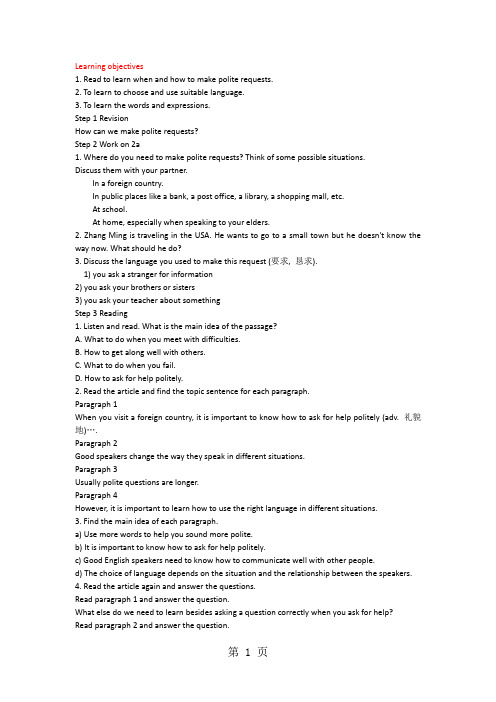
Learning objectives1. Read to learn when and how to make polite requests.2. To learn to choose and use suitable language.3. To learn the words and expressions.Step 1 RevisionHow can we make polite requests?Step 2 Work on 2a1. Where do you need to make polite requests? Think of some possible situations.Discuss them with your partner.In a foreign country.In public places like a bank, a post office, a library, a shopping mall, etc.At school.At home, especially when speaking to your elders.2. Zhang Ming is traveling in the USA. He wants to go to a small town but he doesn't know the way now. What should he do?3. Discuss the language you used to make this request (要求, 恳求).1) you ask a stranger for information2) you ask your brothers or sisters3) you ask your teacher about somethingStep 3 Reading1. Listen and read. What is the main idea of the passage?A. What to do when you meet with difficulties.B. How to get along well with others.C. What to do when you fail.D. How to ask for help politely.2. Read the article and find the topic sentence for each paragraph.Paragraph 1When you visit a foreign country, it is important to know how to ask for help politely (adv. 礼貌地)….Paragraph 2Good speakers change the way they speak in different situations.Paragraph 3Usually polite questions are longer.Paragraph 4However, it is important to learn how to use the right language in different situations.3. Find the main idea of each paragraph.a) Use more words to help you sound more polite.b) It is important to know how to ask for help politely.c) Good English speakers need to know how to communicate well with other people.d) The choice of language depends on the situation and the relationship between the speakers.4. Read the article again and answer the questions.Read paragraph 1 and answer the question.What else do we need to learn besides asking a question correctly when you ask for help?Read paragraph 2 and answer the question.What do we need to think about when we talk to different people?Read paragraph 3 and answer the question.What can lead into a request with a stranger on the street?5. Find all the direct questions and polite requests from the passage.Direct questions Polite requests1. 1. Where are the restrooms?2. When is the school trip?3. Peter, tell me your e-mail address.4. Where’s the post office?1. Could you tell me where the restrooms are?2. Excuse me, Mr. West.Do you know whenthe school trip is?3. Peter, could youplease tell meyour e-mail address?4. Pardon me, could you please tell me where to park my car?6. How do we make direct questions polite?By adding “excuse me〞or “pardon me〞at the beginning of the question.e.g. When does the bus leave?→Excuse me, when does the bus leave?By using “could〞instead of “can〞in questions.e.g. Can you help me?→Could you help me?By adding “please〞at the end of a question.e.g. Could you help me, please? (NOT “Please, could you help me?〞)7. Read the requests below. In the second column, write A if you would say it to someone you know and B if you would say it to a stranger. In the last column, write where you think these people are.Request Person Place1. Will you pass the salt? A home2. Do you know where I can change some money, please? B street3. Could you tell me what just happened? A/B any public place/home4. Can you please tell me where the nearest station is? B street5. Excuse me, do you know what time it begins, please? B movie theater6. Let me know when you’re ready, OK? A home7. Could you possibly tell me the way to the village school? B street8. Tom is talking about polite requests with his friend Lucy. Complete their conversations according to the article.T: Is it important to know ____________________?L: Of course. It is not enough to ______________________.T: I agree with you. We also need to learn ________________________.L: Good speakers change the way they speak in different situations. The expressions they use might depend on _______________________________. And direct questions sounds _________.Usually polite questions are longer. Sometimes we need to _____________________.T: It might seem more difficult to __________________. But using the right language in different situations will help you ___________________.Step 4 SummaryTranslate the phrases into English.恳求帮助依赖;相信例如引入;导入与……联络Step 5 Language points1. convenientconvenient用作形容词,意为“便利的;方便的〞,常用于句型“It+ be+ convenient (+for sb.) +to do sth.〞中。
2020年人教版英语九年级Unit3 SectionB 2a-2d教案设计
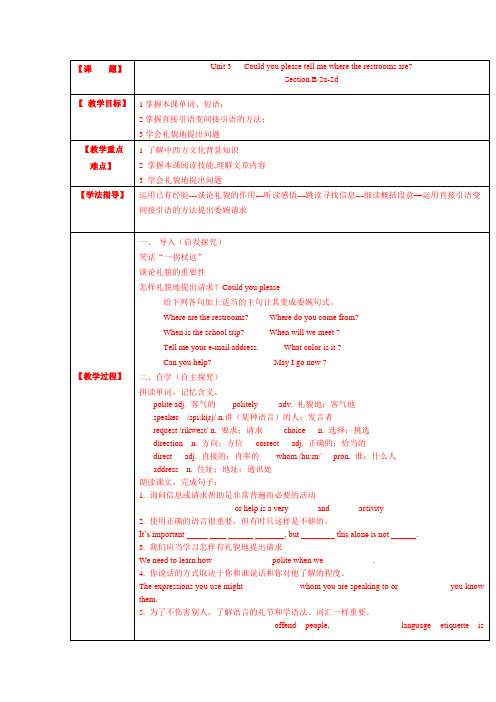
The expressions you use might depend on whom you’re speaking to or 3_________ you know them.A very direct order might sound4_________________in EnglishA longer question with extralanguage “Could you please…?”usually sounds 5______________朗读短语,翻译课文,理解课文并填空1. It's important to know how to ______ in English when we visit a foreign country.2. When you talk with different people, you need to ______.3. Extra words are used to help ______.4. ______ is as important as learning language structure.5. How do you say "Don't smoke here." politely? ______答案1. ask for information politely2. change the way you speak3. make language more politely4. Learning about language etiquette5. Would you mind not smoke here? / Could you please not smoke here?再次仔细阅读课文,判断下列句子的正误。
()When you visit a foreign country, it is important to know how toask for help .()“Where are the restrooms?” and “Could you please tell me where the restrooms are?”are correct English, but the first one sounds more polite()In English, as in Chinese, we change the way we speak when we make convasations with different people.( ) It is all right to ask direct questions in some situations, like with your teachers. ( ) Sometimes we don’t need to spend time leading in to a request.( ) It is important to learn how to use proper language when you speak English.四、总结归纳总结短语:寻求信息普遍而有必要的一件事情听起来粗鲁有礼貌发出请求改变我们谈话的方式取决于另一方面你非常熟悉的人借给某人某物非常直接的命令例如花时间做某事导入一个问题为了精通,擅长归纳总结句型w W w .X k b 1.c O mso that; so …that..; in order (not) toIt might seem that…wonder;lend..to…; borrow…from…; keepsound; look; smell; feel; taste及时练1.The cookies _________ good.Could I have some more?(2010潍坊市中考题)A.taste B.smell C.feel D.sound2.You have to leave now _________ you can catch the early bus.(2010潍坊市中考题)A.so that B.as soon as C.because D.if3. Whether you can enter the high school yourself.(2010东营市中考题)A. calls forB. depends onC. agrees withD. con nects with4. We might even need to spend some time _______ (lead) in to a question or request.5. I w________ if you can help me with my English.6. He studied hard _________ he could catch up with others. (so that, in order to)7. He studied hard _________ catch up with others. (so that, in order to)8. Could you please ____ a pen ___ me? (borrow…from; lend ..to…)9. I want to ____ a pen ____ you. (borrow…from; lend ..to…)2. …“Excuse me, I wonder if you can help me.”……“打扰了,我不知道您是否能帮帮我”。
人教新目标英语初中教学九年级--教案Unit3SectionB2a2e学习教案

人教新目标英语九年级Unit 3 Section B( 2a-2e)教课设计Unit3 SectionB(2a-2e)教课设计学内容Could you please tell me where the科目英restrooms are? SectionB(2a-2d)教课象九年学生1教者一、教材内容剖析本是人教版九年第三元第四,Unit3 Could you please tell me wherethe restrooms are? SectionB (2a-2d)部分。
是一,“不一样文化下不一样的技巧” 一睁开,使学生学会在不一样的境下,使用适合的言来礼貌地和正确地回答。
二、教课目依据新程准的要求,合教材的详细内容,我确定教课目:1.学生在境中感知、理解以下:request, polite, direct。
2.学生通礼貌用的文章,一步感知、理解含有where, when, how引的从句。
3.学生运用思理解篇构,在境中领会不一样的技巧,学会在不一样的境下,使用适合的言来礼貌地和正确地回答。
4.学生学会礼貌待人,学会,建和的人关系。
三、学情剖析1.九年的学生Could you please⋯?句型有了必定的和理解(八年下册Unit3 ),一步学确定了基;that/whether/if 引的从句有了必定的和理解(九上 Unit2 ),本元前三wh-引的从句行了。
本一步稳固wh-引的从句确定了基。
2.九年的学生已具了依据关信息(关,关句型)理解文章的能力。
本稳固依据关理解句子的能力,依据上下文关句型行猜、推理的能力。
3.九年的学生于礼貌礼有了必定的认识,但不太深入,于不一样文化下不同的礼貌用认识不多。
本学在不一样文化下不一样的技巧,学会不一样的境下,使用适合的言来礼貌地和正确地回答。
4.具网源的学生能够上网搜相关不一样文化背景下不一样的礼貌言和人教新目标英语九年级Unit 3 Section B( 2a-2e)教课设计问技巧。
人教版英语九年级全册Unit3SectionB2a2d教学设计

3.口语作业:布置学生与家长或朋友进行一次关于“Dreams and Aspirations”的英语对话,记录下对话内容,并尝试使用课堂上学到的一般过去时和现在完成时来描述对方的过去经历和现在的成就。
3.组织学生进行小组讨论和合作学习,培养学生的团队协作能力和解决问题的能力。
4.引导学生通过自主学习、探究学习,培养学生的学习策略,提高学习效率。
5.设计丰富多样的课堂活动,如角色扮演、情景对话、小组竞赛等,激发学生的学习兴趣,提高课堂参与度。
(三)情感态度与价值观
在本章节的教学中,教师将关注以下情感态度与价值观的培养:
4.词汇练习:设计一份包含本节课重点词汇的填空、改错或配对练习,要求学生在规定时间内完成,以加强词汇的记忆和理解。
5.家庭作业:鼓励学生在家中寻找一个物品或一张照片,以此为契机,用英语讲述这个物品或照片背后的故事,尝试运用本节课所学的时态和词汇。
6.视听作业:推荐学生观看一部英文电影或纪录片,关注影片中人物的梦想和奋斗历程,并记录下至少5个印象深刻的句子,分析这些句子中使用的一般过去时和现在完成时。
-阅读理解:引导学生通过预读、细读、讨论等方式,深入理解文章内容,提高阅读技巧。
-语言实践:设置真实的语境,如模拟面试、写作练习等,让学生将所学知识应用于实际情景中。
3.教学评价设想:
-采用形成性评价,关注学生的学习过程,鼓励学生自我评价和同伴评价,提高学生的自主学习能力。
-设计总结性评价,如单元测试、写作任务等,以评估学生对本章节知识点的掌握程度。
在此基础上,本章节的学情分析如下:
九年级英语全册Unit3CouldyoupleasetellmewheretherestroomsareSectionB(2a-2d)教案新版人教新目标版
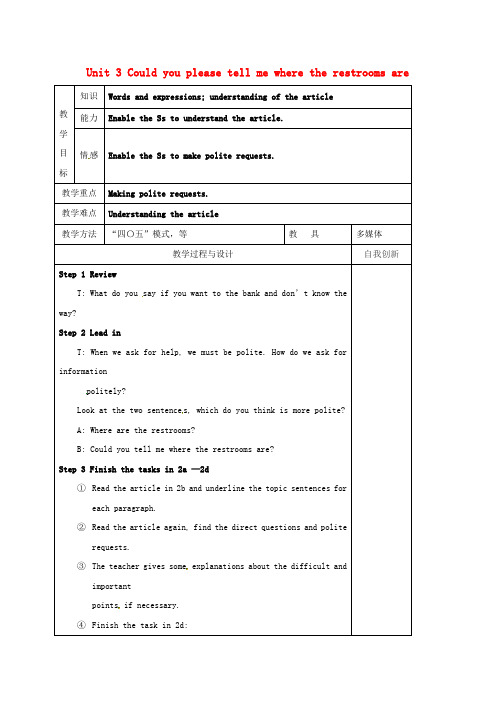
Unit 3 Could you please tell me where the restrooms are教学目标知识Words and expressions; understanding of the article 能力Enable the Ss to understand the article.情感Enable the Ss to make polite requests.教学重点Making polite requests.教学难点Understanding the article教学方法“四〇五”模式,等教具多媒体教学过程与设计自我创新Step 1 ReviewT: What do you say if you want to the bank and don’t know theway?Step 2 Lead inT: When we ask for help, we must be polite. How do we ask for informationpolitely?Look at the two sentence s, which do you think is more polite?A: Where are the restrooms?B: Could you tell me where the restrooms are?Step 3 Finish the tasks in 2a —2d①Read the article in 2b and underline the topic sentences foreach paragraph.②Read the article again, find the direct questions and politerequests.③The teacher gives some explanations about the difficult andimportantpoints if necessary.④Finish the task in 2d:Read the requests below. In th e second column, write A ifyou say it to someone you know and B if yo u would say itto a stranger. In the last column, write where you think新晃第二中学备课纸教学过程与设计自我创新these people are.Step 4 Summary( ) 1 .He answered my questions . It made me pleased.A. politeB. impoliteC. politelyD. impolitely( ) 2. me, could you please tell me where my car?A. Excuse, parkB. Pardon, to parkC. Excuse, parkingD. Pardon, parking Homework:Read the article over and over again.。
人教版英语九年级全册-Unit 3 SectionB (2a—2d)教案
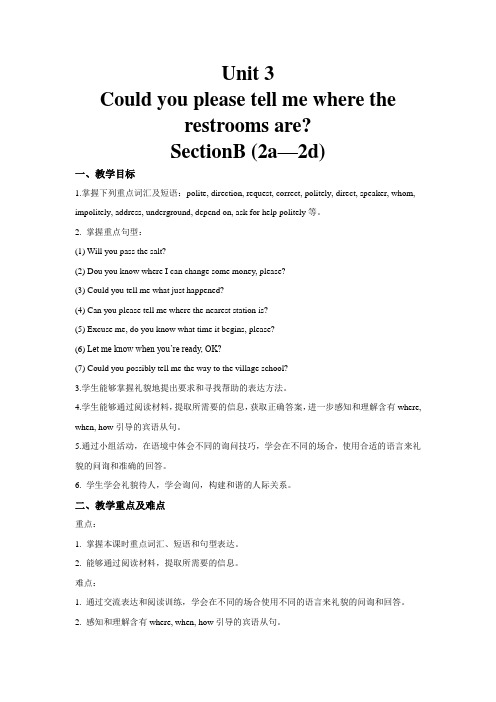
Unit 3Could you please tell me where therestrooms are?SectionB (2a—2d)一、教学目标1.掌握下列重点词汇及短语:polite, direction, request, correct, politely, direct, speaker, whom, impolitely, address, underground, depend on, ask for help politely等。
2. 掌握重点句型:(1) Will you pass the salt?(2) Dou you know where I can change some money, please?(3) Could you tell me what just happened?(4) Can you please tell me where the nearest station is?(5) Excuse me, do you know what time it begins, please?(6) Let me know when you’re ready, OK?(7) Could you possibly tell me the way to the village school?3.学生能够掌握礼貌地提出要求和寻找帮助的表达方法。
4.学生能够通过阅读材料,提取所需要的信息,获取正确答案,进一步感知和理解含有where, when, how引导的宾语从句。
5.通过小组活动,在语境中体会不同的询问技巧,学会在不同的场合,使用合适的语言来礼貌的问询和准确的回答。
6. 学生学会礼貌待人,学会询问,构建和谐的人际关系。
二、教学重点及难点重点:1. 掌握本课时重点词汇、短语和句型表达。
2. 能够通过阅读材料,提取所需要的信息。
难点:1. 通过交流表达和阅读训练,学会在不同的场合使用不同的语言来礼貌的问询和回答。
人教新目标版九全英语 Unit3 SectionB 2a~2d 教学课件
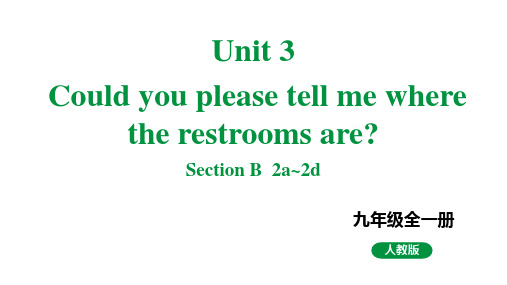
“Where are the restrooms?”
less polite very direct
When you visit a foreign country, it is important to know how to ask for help politely.① For example, you may ask “Where are the restrooms?” or “Could you please tell me where the restrooms are?” These are similar requests for directions.②Both are correct, but the first one sounds less
While-reading
Let’s skim!
2b. Read the article and underline the topic sentence for each paragraph.
Para. 1
When you visit a foreign country, it is important to know how to ask for help politely.
The ways
How can I get to the library? Could you tell me where the library is? Excuse me, do you know where the library is? I’m sorry to trouble you, could you please tell me how to get to the library ?
Warming Up
人教九年级Unit3Section B 2a2d教案
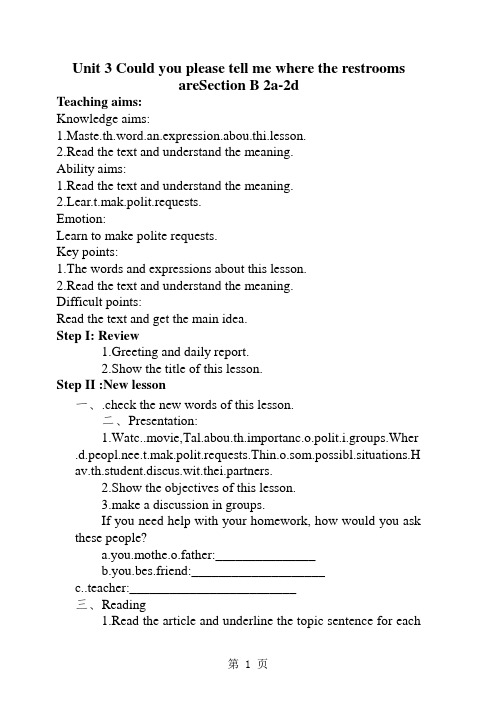
Unit 3 Could you please tell me where the restroomsareSection B 2a-2dTeaching aims:Knowledge aims:1.Maste.th.word.an.expression.abou.thi.lesson.2.Read the text and understand the meaning.Ability aims:1.Read the text and understand the meaning.2.Lear.t.mak.polit.requests.Emotion:Learn to make polite requests.Key points:1.The words and expressions about this lesson.2.Read the text and understand the meaning.Difficult points:Read the text and get the main idea.Step I: Review1.Greeting and daily report.2.Show the title of this lesson.Step II :New lesson一、.check the new words of this lesson.二、Presentation:1.Watc..movie,Tal.abou.th.importanc.o.polit.i.groups.Wher.d.peopl.nee.t.mak.polit.requests.Thin.o.som.possibl.situations.H av.th.student.discus.wit.thei.partners.2.Show the objectives of this lesson.3.make a discussion in groups.If you need help with your homework, how would you ask these people?a.you.mothe.o.father:_______________b.you.bes.friend:____________________c..teacher:_________________________三、Reading1.Read the article and underline the topic sentence for eachparagraph.2.Read paragraph 1 and answer the following question:What else do we need to learn besides asking a question correctly when you ask for help?3.Read paragraph 2 and answer the question.What do we need to think about when you talk to different people?4.Read the whole text,Find all the direct questions and6.Explain the expressions.*Both are correct, but the first one sounds less polite.less + 形容词或副词, 构成降级比较形式, 相当于中文“不那么; 稍许不……”之意。
unit3sectionb教案人教新目标九年级
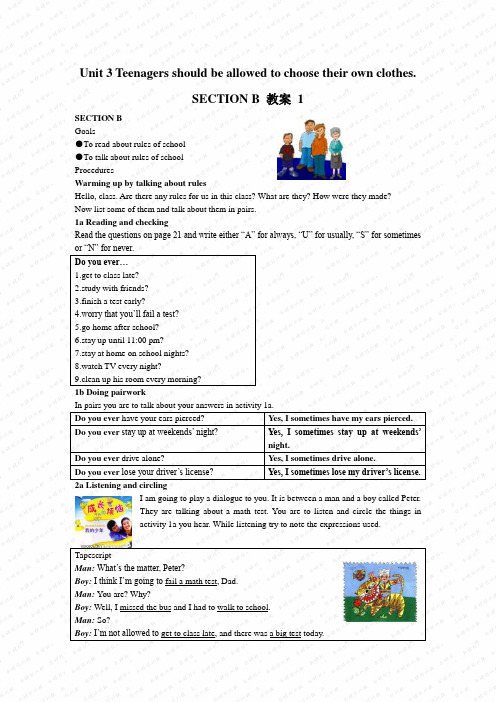
Unit 3 Teenagers should be allowed to choose their own clothes.SECTION B 教案1SECTION BGoals●To read about rules of school●To talk about rules of schoolProceduresWarming up by talking about rulesHello, class. Are there any rules for us in this class? What are they? How were they made?Now list some of them and talk about them in pairs.1a Reading and checkingRead the questions on page 21 and write either “A” for always, “U” for usually, “S” for sometimes or “N” for never.Do you ever…1.get to class late?2.study with friends?3.finish a test early?4.worry that you’ll fail a test?5.go home after school?6.stay up until 11:00 pm?7.stay at home on school nights?8.watch TV every night?9.clean up his room every morning?1b Doing pairworkIn pairs you are to talk about your answers in activity 1a.Do you ever have your ears pierced? Yes, I sometimes have my ears pierced. Do you ever stay up at weekends’ night?Yes, I sometimes stay up at weekends’night.Do you ever drive alone? Yes, I sometimes drive alone.Do you ever lose your driver’s license?Yes, I sometimes lose my driver’s license. 2a Listening and circlingI am going to play a dialogue to you. It is between a man and a boy called Peter.They are talking about a math test. You are to listen and circle the things inactivity 1a you hear. While listening try to note the expressions used.TapescriptMan:What’s the matter, Peter?Boy:I think I’m going to fail a math test, Dad.Man:You are? Why?Boy:Well, I missed the bus and I had to walk to school.Man:So?Boy:I’m not allowed to get to class late, and there was a big test today.Man:And you weren’t allowed to take the test?Boy:That’s right. But I know I could pass that test.Man:Well, Peter, the school has to have rules, you know.Boy:I know. But I should be allowed to take the test later. It’s not fair.Man:I agree. Maybe you could talk to the teacher after school.Boy:Yeah. Maybe if I explain what happened, she’ll understand.2b Listening and matchingListen again to the dialogue and match the sentence parts in the box on page 21.Now copy down the expressions from the dialogue into your notebook. They areshown on the blackboard.2c Doing group workRead the statements and discuss them with your group members.1.Peter should be allowed to take the test later.A: I think Peter should not be allowed to takethe test later.B:I don’t agree.C: I think he could take it with Class 2tomorrow.2.Students need strict rules.…3.Parents should not be too strict withteenagers.…4.Mary should not fail a math test.…5.We will miss the bus.…6.I have to walk to school.…7.We can talk to the teacher after school.…3a Reading and answeringNext it’s reading time. Let’s read the article on page 22 and answer the questions following it. Try to put the sentences into parts and underline the expressions.The other day, my friends and I/ talked about the rules/ that we have/ in school. At our school, we have to wear uniforms/ every day. The problem is that/ all my classmates/ think/ the uniforms are ugly. We think/ young people should look smart/ and so/ we would like to wear our own clothes. Our teachers believe that/ if we did that, we would concentrate more on our clothes/ than our studies. We disagree. We would feel more comfortable/ and that is good/ for studying. If we can't do that, we should be allowed/ to design our own uniforms. That would be a good way/ to keep both teachers and students/ happy. It’s also probably a good idea /for parents/ to allow teenagers/ to study/ in groups/ during evening. I know/ we get noisy sometimes, but/ we learn a lot /from each other. We also think that/ vacations should be longer. Atpresent/ they're too short. Longer vacations/ would give us time/ to do things/ like volunteering. Last summer/ I had an opportunity/ to volunteer/ at the local hospital, but/ I couldn’t/ because/ I had to go back to schools. It would be a good experience/ for me/ because I want to be a doctor/ when I'm older.3b Doing pairworkRole play a conversation using information from 3a.A: I think our school rules of always wearing school uniforms at school should be changed.B: Well, Mary and I talked about the rules the other day.A: At our school, we have to wear uniforms every day. That is bad forus.B: Yes, I agree. The problem is that all of us think the uniforms are ugly.A: I think young people should look smart and so we should be allowedto wear our own clothes.B:But our teachers believe that if we did that, we would concentratemore on our clothes than our studies.A: I disagree with them. We would feel more comfortable and that is good for studying. If we can't do that, we should be allowed to design our own uniforms. That would be a good way to keep both teachers and us happy.B:It’s also probably a good idea for parents to allow us to study in groups during evening.A: I think so. I know we get noisy sometimes, but we learn a lot from each other.B: I also think that vacations should be longer.A:I agree with you on that. At present they're too short. Longer vacationswould give us time to do things like volunteering.B: Last summer I had an opportunity to volunteer at the local hospital, but Icouldn’t because I had to go back to schools. It would be a good experience for me because I want to be a doctor when I'm older.A:Let’s go to talk to our teachers about the school rules after school.B: OK! I agree with you!4 Making a list of rulesSuppose you and your friend are starting an English club. Make a list of rules about what should and should not be allowed.1. Members are allowed to work with a group.2. Members are allowed listen to English.3. Members are allowed play games with theirclassmates.4. Members are allowed do actions such as coloring,matching.5. Members are allowed sing English songs.6. Members are allowed to write letters and emails.7. Members are allowed act out simple dialogues.8. Members are allowed listen to and understandstories.9. Members are allowed to write simple sentences.10. Members are allowed to imitate from therecording.Closing down by learning an English poemGet Up! Get Up!"Get up! Get up! Get out of bedyou lazy bum, you sleepyhead."Yes, that is what my mother saidat eight-oh-five today.She left the house and drove to work. She'll soon be feeling like a jerkwhen she finds out -- I have to smirk --Today is Saturday.--Kenn Nesbitt。
- 1、下载文档前请自行甄别文档内容的完整性,平台不提供额外的编辑、内容补充、找答案等附加服务。
- 2、"仅部分预览"的文档,不可在线预览部分如存在完整性等问题,可反馈申请退款(可完整预览的文档不适用该条件!)。
- 3、如文档侵犯您的权益,请联系客服反馈,我们会尽快为您处理(人工客服工作时间:9:00-18:30)。
5.教师点拨短文中出现的重点和难点。(3分钟)
6.熟读短文,识记并背诵知识要点。(5分钟)
7.认真阅读2d表格中的请求,如果你认为这个请求是对你认识的人说的,就在Person栏中填写A,如果你认为这个请求是对陌生人说的,就在Person栏中填写B;在Place栏中写出你认为这些请求可能发生的地方。(5分钟)
C.who she was waiting
D.where did you live
(A)4.Could you tell me where we ________ next week?
A.would go B.to go
C.had to go D.going
(D)5.Could you tell me how much ________ to fly to Hainan?
(C)2.Please tell me ________.
A.what does he likeB.what he does like
C.what he likes D.what he like
(B)3.My sister told him ________.
A.what day was it
B.when the train arrived
A.do it cost B.does it cost
C.it cost D.it costs
(B)6.The small children don't know ________.
A.what is their stockings in
B.what is in their stockings
C.where is ຫໍສະໝຸດ heir stockings in
实验初中英语组备课活页(主页)
课题Unit3Section B(2a-2d)年级九年级
教学目标1.重点单词:politely,request,direction,correct,polite,direct,indirect,speaker,whom,impolite,address,underground
I'm sorry to trouble you.
It might seem more difficult to speak politely than to be direct.
This will also help you become better at English,or any other language you wish to speak.
2.重点短语:a very direct question,ask for,lead in,parking lot
3.重点句式:
When you visit a foreign country,it is important to know how to ask for help.
The expressions they use might depend on whom they are speaking to or how well they know each other.
A.will come;will come
B.comes;comes
C.will come;comes
D.comes;will come
答案选择C,if和when既可以引导宾语从句,也可以引导状语从句,应注意它们在两种从句中的意思和用法的不同。if和when引导宾语从句时,分别意为“是否”和“何时”,其时态应和主句时态相呼应;它们引导状语从句时,意思分别为“如果,假如”和“当……时候”,当主句时态是一般将来时时,其时态用一般现在时。根据句意“你知道他明天什么时候会来吗”,判断when意为“何时”,引导宾语从句;根据句意“当他回来的时候,我将告诉你”,判断when意为“当……时候”,引导时间状语从句,因此答案选择C。
环节说明:这个环节讨论的问题不仅能锻炼学生的思维,同时又引出了本节课的学习重点——2b中的短文。
Step 2完成教材2a-2d的任务
1.在什么情况下我们需要有礼貌的提出请求,想象一下有可能的情况,然后在小组内互相交流。(3分钟)
2.快速略读2b中的短文,画出每个段落的主题句。(3分钟)
3.认真阅读2b中的文章,从短文中找出所有的直接问句和有礼貌的请求,完成2c中的表格。(3分钟)
8.小结训练。(5分钟)
(C)1.Could you show me ________?
A.how can I get to the station
B.where is the station
C.how I could get to the station
D.how I can reach the station
备课教师补充添加
重难点:1.重点短语和句型
2.能够有礼貌地提出请求
教具(器材)
1.A tape recorder
2.Some pictures
课堂流程
Step 1情景导入Step 2完成教材2a-2d的任务
Step 3问题探究
重点单词:
教学过程(环节、措施、方法……)
Step 1情景导入
Teacher:Think about the questions and talk about them in groups:What is important when people ask for information or help?What might the expressions we use depend on?What kind of questions are polite in English?
D.what is their stockings
环节说明:通过本环节的学习不仅锻炼了学生的阅读能力,而且通过小结训练让学生对重要知识点进行了巩固练习。
Step 3问题探究
()1.—Do you know when he ________ back tomorrow?
—Sorry,I don't know.When he ________ back,I'll tell you.
